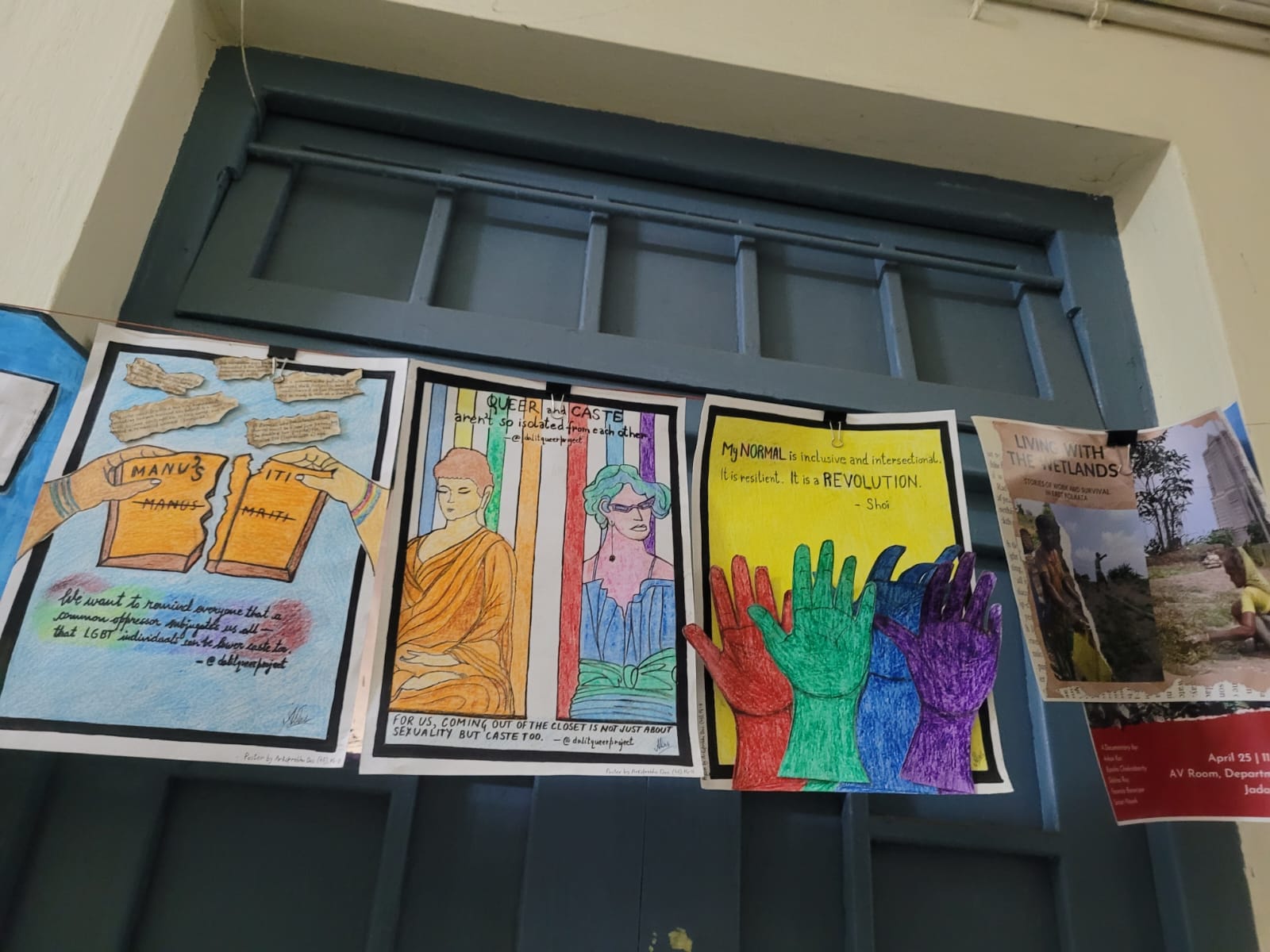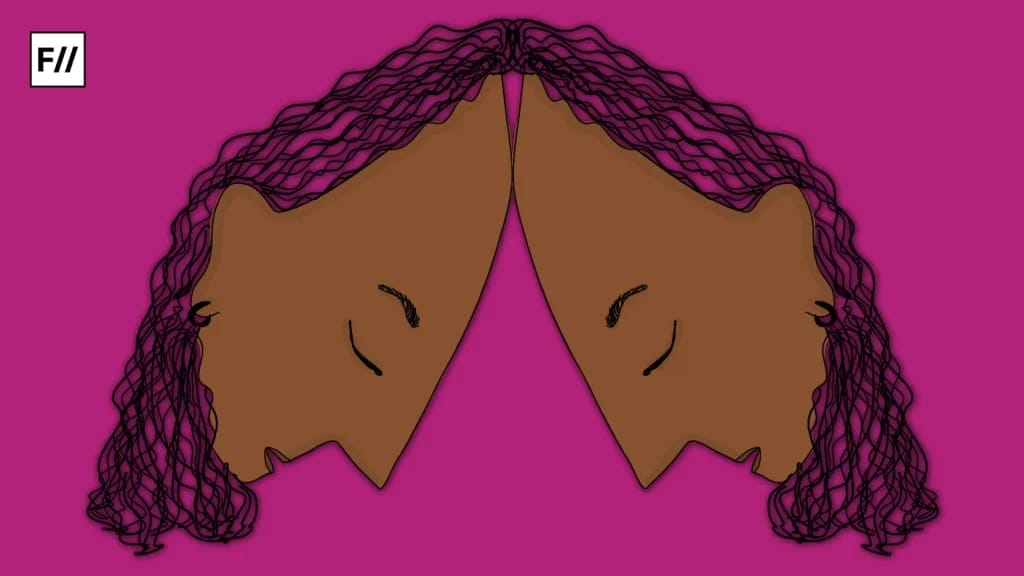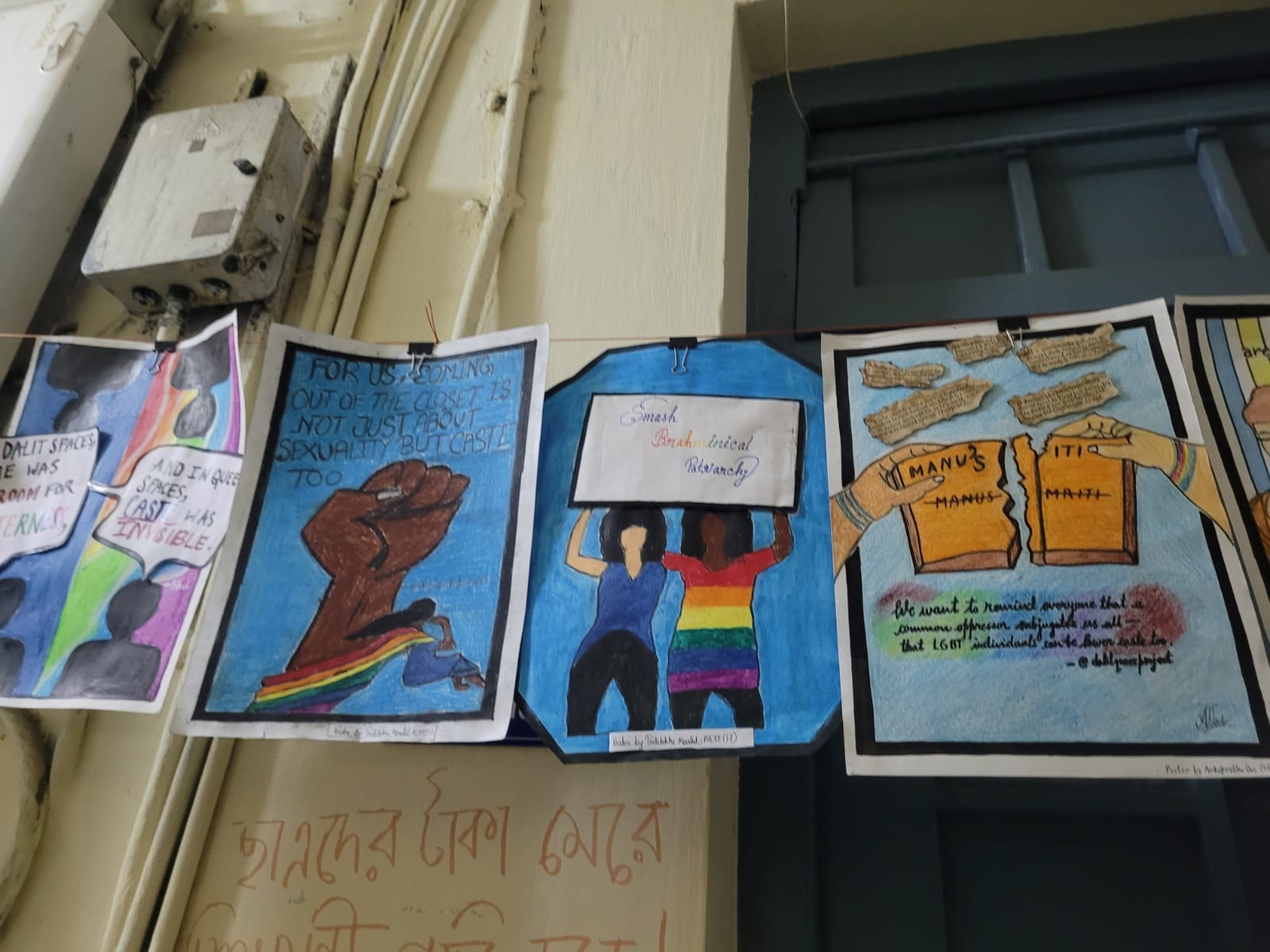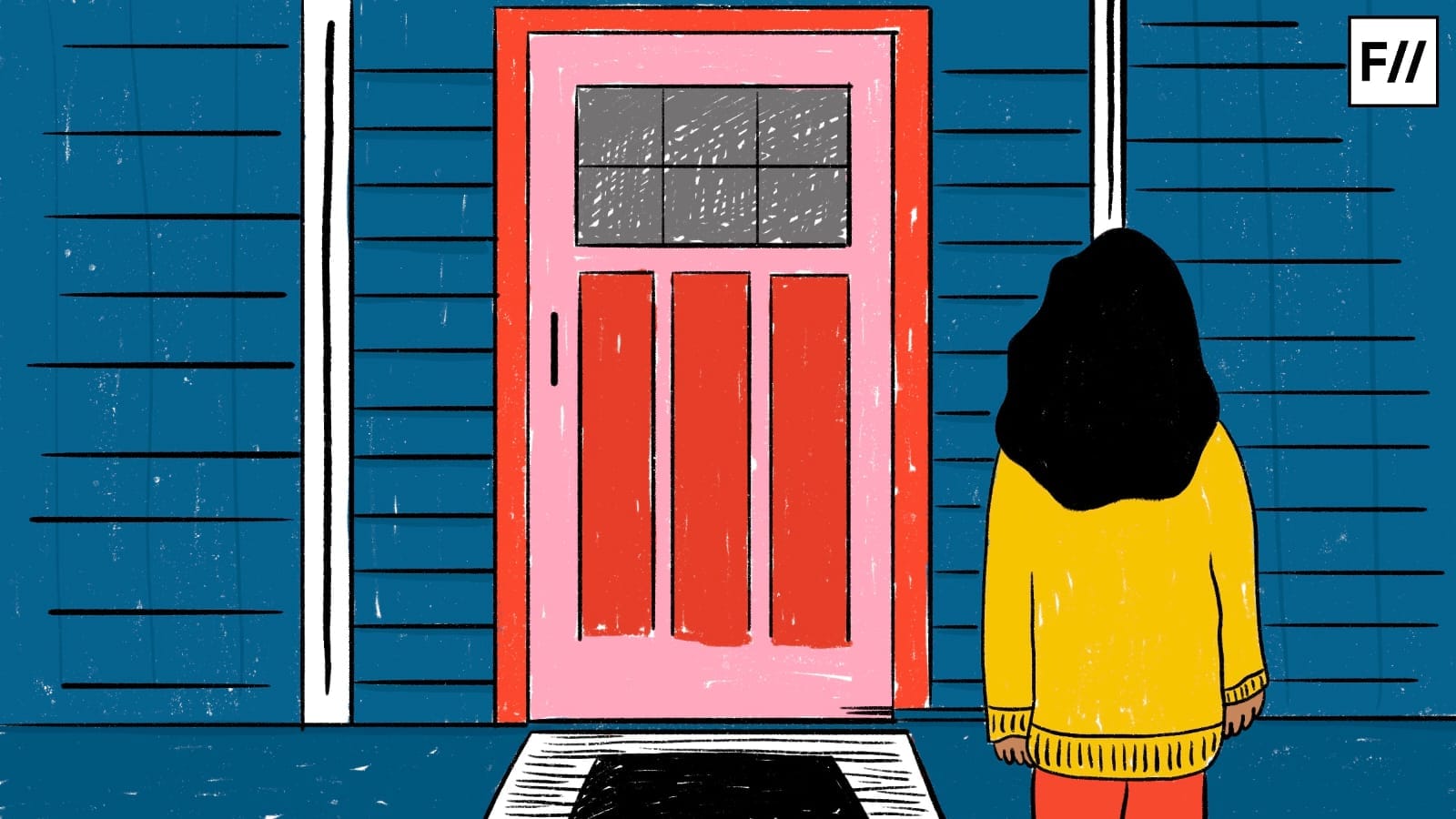This year in June, Chennai’s Ethiraj College made the news by enrolling its first-ever trans student. Shivin Palanivel was admitted to the Bachelor of Commerce in Corporate Secretaryship (BCom CS) with a full scholarship. However, as we celebrate success stories like Shivin’s college acceptance, the question emerges: how is her campus experience going to be? For students like Shivin who have been transitioning, the Indian campus is not too kind.
Although, data from the Ministry of Education and the All India Survey on Higher Education (AISHE) indicates an almost five-fold increase in transgender student enrollment in universities and colleges, from 302 in 2020-21 to 1,448 in 2022-23, in Indian University spaces, trans students who are in the process of transitioning are often faced with a burning dilemma: take your dead identity and do not incite unsolicited questions or bullying during the transitioning process, or embody your true gender identity and pronouns, incurring the heteronormative gaze and scrutiny on campus. Moreover, not everyone transitions the same- some go through medical transition, using hormone replacement therapy and gender affirmative surgery, while some transition socially, dressing like the gender they identify with and performing their true gender identity. Some trans individuals pass easily, and some do not. However, nearly all queer-trans students face hostile experiences on college campuses, especially during and after their transitioning journey.
Despite increasing focus on LGBTQIA+ issues in India, including the decriminalisation of Section 377, the passing of the Transgender Persons (Protection of Rights) Act, and the legal discussions on marriage equality, there is little social acceptance of trans people, and they are often deemed synonymous with the hijda community, which is inherently an occupational category. The community faces systemic hurdles while accessing education, and they are relegated to performing gendered jobs like begging, performing and sex work, among others.

The campus space, which is a microcosm of Indian society, replicates this marginalisation by overtly or covertly discriminating against trans students. Many young trans people, when they come of age in college and come to terms with their gender identity, choose to medically or socially transition. Since the university space doesn’t have the strict restrictions and binaristic uniform culture of a school, it allows for some degree of self-expression. ‘During college, I was staying away from my natal family and home town for the first time. I was alone in a metro city and I felt I could start transitioning‘, says Jay*, a trans man studying in Calcutta University.
However, while the urban campus space can be truly liberating for some trans students, it can also be limiting. There are several barriers they face in accessing education, including administrative hurdles within the campus, harassment, bullying and discrimination, especially in hostels, campus washrooms and classrooms. Therefore, since the campus space has not previously been evaluated through a trans feminist lens, and the gendered experiences of transitioning students have not been documented in mainstream media and policy discourses, there is an urgent need to bridge that gap by focusing on the experiences of transitioning, whether medically or socially, as a student in an Indian University campus and its effects on the student’s mental and social well being.
Healthcare support for trans people on campuses
Very recently, with the discourse around IIT Kharagpur’s initiative to appoint “campus mothers”, the question of mental health support in university spaces took centre stage. While the IIT’s initiative reiterates the gendered labour of care and is mired in a patriarchal rhetoric, it is undeniable that there needs to be empathetic and equitable mental health support systems on campuses. However, more often than not, these campus counsellors are insensitive, rude and inaccessible. ‘When I told the campus therapist that I suffer from gender dysphoria, they laughed at me and trivialised my experiences‘, says Saira Chakraborty, a trans woman and recently graduated student of SSKM Hospital and Medical College in Kolkata.
‘When I told the campus therapist that I suffer from gender dysphoria, they laughed at me and trivialised my experiences‘, says Saira Chakraborty, a trans woman and recently graduated student of SSKM Hospital and Medical College in Kolkata.
Among the respondents, though, Saira remains one of the few who could avail the services of a campus therapist. Many students, especially those who are in the process of transitioning and need psychosocial support, do not even know if their campus has mental health support systems, given the lack of information around such facilities on campus.

Saira, who was a medical student, had also gone to the endocrinology department on campus to access Hormone Replacement Therapy (HRT). ‘When I first went there, I was not on any hormones. When they heard I was a student trying to access gender affirmative healthcare, they laughed at me, saying they could not imagine a trans woman student at the prestigious medical college. When I went a second time, I was female passing. They appointed a male doctor to examine me below the waist while a female doctor examined the rest of my body. The experience was harrowing, and I felt that my body was being divided and partitioned like India and Pakistan,’ Saira says.
However, not all campus health care systems are traumatising. For M*, a transfeminine person who has studied in NIFT Bhubaneswar, unexpected support came in the form of a campus counsellor who helped her through her struggle with schizophrenia and gender dysphoria. ‘Back then, at one point, I considered having Sexual Reassignment Surgery (SRS). She even said that she will support me through that,’ says M.
No gender neutral washrooms or hostel facilities on campuses
The right to housing and Water, Sanitation, and Hygiene (WASH) facilities are basic necessities. However, the binaristic conceptualisation of hostel and washroom spaces on campus limits trans students’ access to these spaces. ‘While transitioning, if you do not pass for the gender you identify with, you are stuck in a space with the other gender,‘ says Jay.
M, who has also studied in Scottish Church College in Kolkata for a while, recounts how there were gender segregated common rooms, which disallowed trans and gender diverse students like her from finding safe spaces within campus.
M, who has also studied in Scottish Church College in Kolkata for a while, recounts how there were gender segregated common rooms, which disallowed trans and gender diverse students like her from finding safe spaces within campus.
‘The condition of the washroom was pathetic as well. While there was a ladies’ washroom, the gents’ washroom which I had to use was far off, outside the campus. I never felt comfortable to use it,’ says M.
Saira and her partner Paro, who is an ex-student of the Bhawanipore Gujarati Education Society in Kolkata recounted how, as trans students who were in the process of transitioning, they had to learn how to not use the washroom for long hours. ‘Especially, during ward medical duty, which would go on for prolonged periods, it was very uncomfortable and difficult not to be able to use the washroom,’ says Saira.

‘The experience of transitioning on campus is especially harrowing for students because of the invisibilisation they face daily on campuses‘, says Aritra Chatterjee, a mental health professional based in Kolkata. ‘Sometimes in Social Sciences departments, the faculty is sensitive, but there is a lack of gender sensitisation among non-teaching staff like security guards, hostel wardens and administrative workers whom the students have to interact with daily.’
When asked whether there are any trans students in the hostel, the persons in-charge in the Jadavpur University hostels as well as the hostel security guards said ‘There is no one like that in the hostel and no one like that has ever asked for hostel accommodation here‘. The fact that trans students do not avail hostel spaces in most Indian universities is rooted in the systemic exclusion of trans students from these spaces. ‘Even though I wanted to get a PG for a while, I’ve always felt that my home would be better than the boys’ hostel on campus,’ says M.
Lack of trans rights on campus is linked to the State’s attack on liberal universities and their autonomy
The campus student union elections came to a halt across higher education institutions in West Bengal a little before the COVID-19 pandemic in 2020. In early 2025, students of Jadavpur University staged protests demanding the resumption of elections, which had been withheld in the institution for five years. Abir Sheet, one of the campaigning students from JU-SFI highlights the need for union elections to facilitate trans rights in Indian campus spaces.
When asked whether there are any trans students in the hostel, the persons in-charge in the Jadavpur University hostels as well as the hostel security guards said ‘There is no one like that in the hostel and no one like that has ever asked for hostel accommodation here‘.
‘Despite the core leftist idea that economic disparity has been the root of all social injustices in history, my organisation (SFI) has been fighting for the equal representation of trans and queer people. Apratim Roy and Nandhana Vishnu are among those who have publicly asserted their trans identities and represented SFI on a national level. On the 3rd of March 2024, the SFI Delhi University Unit called for a General Body student meeting to finalise the charter of the Queer Students’ Manifesto. Mehina Fatima, the moderator of the meeting, has been advocating for the rights of horizontal reservation for trans students in all educational institutions,’ he said.
Although there has been minimal representation of transitioning students in the Arts Faculty Students Union in JU till date, Abir mentions that now they have a considerable number of trans and queer student activists and leaders on our campus. ‘As an organisation, we have always strived to foster a safe space for our comrades to come out and assert their sexuality without the fear of being judged,’ he says.
Abir highlights the role of progressive student organisations in furthering trans rights and representation on campus. JU-SFI actively participated in the students’ struggle that led the authorities to accept the demand for a restructured ICC with elected student representatives for the first time in Eastern India. ‘We believe that a properly functioning ICC would assist students from the LGBTQIA+ community in fighting violence based on gender and sexuality that they are often subjected to. Moreover, we don’t want trans rights to be exclusively accessible to a specific social class. In short, we need to unite students to make transgender rights a social reality for people of all social strata. I believe only a democratic union can foster that safe space ‘ he asserts.
Misgendering, deadnaming and discrimination: everyday realities of trans students on campus
For trans students, discrimination comes in myriad forms: from overt and outright hate to passive and covert discrimination. ‘Once I was ridiculed by two cis male students. They were laughing at me because they could not understand if I was a girl or a boy‘ says M. Some trans students do not feel comfortable asserting their true identity on campus and silently emulate their dead identity for fear of ostracism. ‘I never took my preferred name or used my preferred pronouns on campus. That way, I was not subjected to direct hate in my very heterosexual engineering college campus,’ says Artes, a trans woman who has recently finished her BTech degree in Kolkata.

Julian, a trans masculine student from Jadavpur University, also recounts never feeling comfortable coming out to any staff or faculty members on campus, because he was apprehensive about what their reactions would be. He also remembers being misgendered on campus. ‘I do not know if the misgendering was intentional, however, a few of the students I’ve encountered have often been confused or reluctant to accept who I am or identify as a person. It is also suffocating at times to not be able to openly speak about my gender identity in front of professors or other non-teaching staff,’ he says.
Saira also recounts alienation from peers on campus, a covert form of discrimination. Nearly all the trans students FII spoke to recounted a lack of social group and peer support. ‘I had one or two friends on campus. I used to come to college, do my classes and immediately leave,‘ says Jay.
Bridging the gender gap through pedagogy
The importance of pedagogy to initiate conversation around trans experiences on campus was highlighted by Dr. Kaustav Bakshi, professor of English at Jadavpur University and one of the coordinators of the famed Queer Studies course in the Department. ‘It is important to have a campus which is queer and trans friendly. We have been curbing extremist and bigoted rhetoric on campus. Queering is important to challenge authority and talk back to power,’ says Dr. Bakshi. ‘Students have come out to us during the Queer Studies classes, we have had extremely important discussions, and they have found their paths in interesting ways. Some have chosen to transition medically, some have not. My experience teaching queer studies has also shown how sexuality is fluid, changing constantly with time and experiences. As part of the Queer Studies course, students have also researched and done projects on gender transitioning narratives,’ he adds.
The importance of pedagogy to initiate conversation around trans experiences on campus was highlighted by Dr. Kaustav Bakshi, professor of English at Jadavpur University and one of the coordinators of the famed Queer Studies course in the Department.
However, Aritra Chatterjee points out, ‘Queer acceptance and an understanding of queer issues is only prevalent in some Humanities and social sciences departments. In STEM and commerce departments, there is little understanding of gender diversity and trans realities.’
‘The only context in which trans people were talked about in pedagogy in our medical college was a criminal context in the Forensic department class,’ reaffirms Saira.
As the crackdown on trans rights becomes more and more hostile globally, trans students are faced with a precarity of existence in higher education spaces. As the UK rolls back trans rights and the USA attacks trans people based on employment and gender affirmative healthcare, it becomes increasingly difficult yet crucial to create a campus space which would be a bastion of progress and a safe space for transitioning students. In these contexts, campus authorities, faculty, students and stakeholders have to radically reimagine the University space beyond the binary, one trans student at a time.
*names withheld to protect identity.
This article has been published under the Laadli Media Fellowship 2025. The opinions and views expressed are those of the author. Laadli and UNFPA do not necessarily endorse the views.
About the author(s)
Ananya Ray has completed her Masters in English from Jadavpur University, Kolkata, India. A published poet, intersectional activist and academic author, she has a keen interest in gender, politics and Postcolonialism.






Hi. It is a very good article on how educational institutes hold the power to make the society gender sensitive and trans-inclusive. And there is a long way to go ahead. Realted to this, request you to please have alook at my recently published article here https://vc.bridgew.edu/jiws/vol27/iss3/5/. Thanks